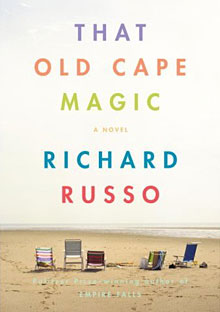
By Richard Russo
272 pages; Knopf
"Late middle age," as Jack Griffin, screenwriter, college prof, and protagonist of Richard Russo's novel That Old Cape Magic, "was coming to understand, was a time of life when everything was predictable and yet somehow you failed to see any of it coming." In the short year between his daughter Laura's best friend's Cape Cod wedding and Laura's own wedding on the coast of Maine, Jack's life has gone significantly south. He has separated from Joy, his wife of 30 years, and put his academic career on hold, his agent in Hollywood has been found dead in his bed, and Griffin is carrying the ashes of both parents around in the trunk of his rent-a-car, hoping to fulfill his mother's request to scatter her ashes on the Atlantic side of the Cape, and his father's into the bay. His mother (who finds kindness "fabulously exotic") has become far more talkative since her death, and seems to have developed a ventriloquistic power over Jack that gets him punched in the face at the rehearsal dinner by his soon to be ex-brother-in-law. More real to him than any current calamity are memories of "The Summer of the Brownings," when Griffin, 11, fell wholly in love with a family in a neighboring cottage, understanding for the first time that his parents' unfriendly, unfaithful, exhausted version of marriage was not the only model available. In one of America's most mythic landscapes, Russo details one man's shaky first steps out of his past and into self-knowledge with good humor, generosity, and an open heart. — Pam Houston
272 pages; Knopf
"Late middle age," as Jack Griffin, screenwriter, college prof, and protagonist of Richard Russo's novel That Old Cape Magic, "was coming to understand, was a time of life when everything was predictable and yet somehow you failed to see any of it coming." In the short year between his daughter Laura's best friend's Cape Cod wedding and Laura's own wedding on the coast of Maine, Jack's life has gone significantly south. He has separated from Joy, his wife of 30 years, and put his academic career on hold, his agent in Hollywood has been found dead in his bed, and Griffin is carrying the ashes of both parents around in the trunk of his rent-a-car, hoping to fulfill his mother's request to scatter her ashes on the Atlantic side of the Cape, and his father's into the bay. His mother (who finds kindness "fabulously exotic") has become far more talkative since her death, and seems to have developed a ventriloquistic power over Jack that gets him punched in the face at the rehearsal dinner by his soon to be ex-brother-in-law. More real to him than any current calamity are memories of "The Summer of the Brownings," when Griffin, 11, fell wholly in love with a family in a neighboring cottage, understanding for the first time that his parents' unfriendly, unfaithful, exhausted version of marriage was not the only model available. In one of America's most mythic landscapes, Russo details one man's shaky first steps out of his past and into self-knowledge with good humor, generosity, and an open heart. — Pam Houston

By Jhumpa Lahiri
352 pages; Knopf
The title of Jhumpa Lahiri's ferociously good new collection of stories tells you what to expect: Unaccustomed Earth (Knopf). As in her previous works, such as her acclaimed novel The Namesake, Lahiri is interested in the strangeness of our lives, in the gaps between who we thought we'd be and who we are, where we're born and where we end up. The Bengali characters who populate these eight stories all have one foot in two camps. Even those, like the beautiful Sang in "Nobody's Business," who have no sentimentality about their birth culture and have embraced Western customs feel the weight of the past. In exquisitely attuned prose, Lahiri notes the clash between generations and the humor of these superambitious parents who want straight-A kids fit for contemporary American life but also want to arrange their marriage. Lahiri is emotionally precise about her characters and the way the world appears to them, especially in the superb "Hema and Kaushik," a trio of linked stories that achingly reveals how two very unlikely families end up under one suburban roof for a while, and how destiny entwines them forever. These are unforgettable people, their stories unforgettably well told. — Elaina Richardson
352 pages; Knopf
The title of Jhumpa Lahiri's ferociously good new collection of stories tells you what to expect: Unaccustomed Earth (Knopf). As in her previous works, such as her acclaimed novel The Namesake, Lahiri is interested in the strangeness of our lives, in the gaps between who we thought we'd be and who we are, where we're born and where we end up. The Bengali characters who populate these eight stories all have one foot in two camps. Even those, like the beautiful Sang in "Nobody's Business," who have no sentimentality about their birth culture and have embraced Western customs feel the weight of the past. In exquisitely attuned prose, Lahiri notes the clash between generations and the humor of these superambitious parents who want straight-A kids fit for contemporary American life but also want to arrange their marriage. Lahiri is emotionally precise about her characters and the way the world appears to them, especially in the superb "Hema and Kaushik," a trio of linked stories that achingly reveals how two very unlikely families end up under one suburban roof for a while, and how destiny entwines them forever. These are unforgettable people, their stories unforgettably well told. — Elaina Richardson
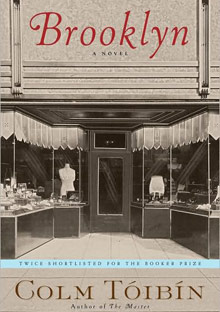
By Colm Tóibín
272 pages; Simon & Schuster
In Colm Tóibín's Brooklyn —a classical coming-of-age story, pure, unsensationalized, quietly profound—Eilis Lacey, unable to find suitable employment in small-town, post–World War II Ireland, ships off to Brooklyn for the promise of a job in a clothing shop, a room in an Irish-only boardinghouse, and the part-time friendship of her sponsor, the charismatic and persuasive Father Flood. In America Eilis discovers all manner of things unimaginable to those she leaves behind in Enniscorthy: Coney Island, Ebbets Field, heat that stays on all night in winter, and a soul-wrenching homesickness she can scarcely shake off.
Deftly, subtly, Tóibín catches the incremental openings this new life engenders in Eilis's mind and heart in sentences that both describe and imitate her growing expansiveness. After making love for the first time with her Italian boyfriend, Tony, Eilis thinks, "He seemed lost to the world. And this sense of him as beyond her made her want him more than she had ever done, made her feel that this now and the memory of it later would be enough for her and had made a difference to her beyond anything she had ever imagined."
There are no antagonists in this novel, no psychodramas, no angst. There is only the sound of a young woman slowly and deliberately stepping into herself, learning to make and stand behind her choices, finding herself able to withstand hardship (a storm at sea or the death of a loved one), growing into the wisdom that fate will render all our choices irrelevant in the end. — Pam Houston
272 pages; Simon & Schuster
In Colm Tóibín's Brooklyn —a classical coming-of-age story, pure, unsensationalized, quietly profound—Eilis Lacey, unable to find suitable employment in small-town, post–World War II Ireland, ships off to Brooklyn for the promise of a job in a clothing shop, a room in an Irish-only boardinghouse, and the part-time friendship of her sponsor, the charismatic and persuasive Father Flood. In America Eilis discovers all manner of things unimaginable to those she leaves behind in Enniscorthy: Coney Island, Ebbets Field, heat that stays on all night in winter, and a soul-wrenching homesickness she can scarcely shake off.
Deftly, subtly, Tóibín catches the incremental openings this new life engenders in Eilis's mind and heart in sentences that both describe and imitate her growing expansiveness. After making love for the first time with her Italian boyfriend, Tony, Eilis thinks, "He seemed lost to the world. And this sense of him as beyond her made her want him more than she had ever done, made her feel that this now and the memory of it later would be enough for her and had made a difference to her beyond anything she had ever imagined."
There are no antagonists in this novel, no psychodramas, no angst. There is only the sound of a young woman slowly and deliberately stepping into herself, learning to make and stand behind her choices, finding herself able to withstand hardship (a storm at sea or the death of a loved one), growing into the wisdom that fate will render all our choices irrelevant in the end. — Pam Houston

By Elizabeth Strout
288 pages; Random House
"Don't be scared of your hunger," Olive Kitteridge always told her seventh-grade math students. "If you are scared of your hunger, you'll just be one more ninny like everyone else." Now Olive is retired, living out her life with her affable husband, Henry, in their small coastal town in Maine, and coming to understand that in spite of her efforts to subdue them, most hungers only intensify with age. Perceptive, deeply empathetic, and even more deeply flawed, Olive is the axis around which these 13 complex, relentlessly human narratives spin themselves into Elizabeth Strout's unforgettable novel in stories, Olive Kitteridge (Random House). "She didn't like to be alone," the narrator tells us shortly after a stroke confines Henry to a nursing home. "Even more, she didn't like being with people." This is the essence of Olive, contradictory, locked down tight, but capable of flights of emotion all the more heart-stoppingly beautiful because of their infrequency. As we meet the townspeople through her eyes—a young pharmacist widowed in a hunting accident, a feisty anorexic runaway, a family man building a boat too big to ever remove from his basement (to name only a few)—we feel acutely both the encroaching despair within Olive and the miraculous return of hope, "that inner churning that moves you forward," that "sudden, surging greediness for life." — Pam Houston
288 pages; Random House
"Don't be scared of your hunger," Olive Kitteridge always told her seventh-grade math students. "If you are scared of your hunger, you'll just be one more ninny like everyone else." Now Olive is retired, living out her life with her affable husband, Henry, in their small coastal town in Maine, and coming to understand that in spite of her efforts to subdue them, most hungers only intensify with age. Perceptive, deeply empathetic, and even more deeply flawed, Olive is the axis around which these 13 complex, relentlessly human narratives spin themselves into Elizabeth Strout's unforgettable novel in stories, Olive Kitteridge (Random House). "She didn't like to be alone," the narrator tells us shortly after a stroke confines Henry to a nursing home. "Even more, she didn't like being with people." This is the essence of Olive, contradictory, locked down tight, but capable of flights of emotion all the more heart-stoppingly beautiful because of their infrequency. As we meet the townspeople through her eyes—a young pharmacist widowed in a hunting accident, a feisty anorexic runaway, a family man building a boat too big to ever remove from his basement (to name only a few)—we feel acutely both the encroaching despair within Olive and the miraculous return of hope, "that inner churning that moves you forward," that "sudden, surging greediness for life." — Pam Houston

By Joseph O'Neill
272 pages. Pantheon
The chill and clarifying breeze wafting through Joseph O'Neill's Netherland (Pantheon) comes from Holland, the childhood home of Hans, a Manhattan financial analyst, and the source of his persistent hunger for human connection. His marriage fallen apart, his life adrift, reticent Hans strikes up an unlikely friendship with an ebullient Trinidadian Gatsby, "a willful, clandestine man" he meets on a Staten Island cricket field. The complex game of cricket serves as this exquisitely articulated novel's metaphor for civility wrested from chaos and the oblique trajectory of hope. — Cathleen Medwick
272 pages. Pantheon
The chill and clarifying breeze wafting through Joseph O'Neill's Netherland (Pantheon) comes from Holland, the childhood home of Hans, a Manhattan financial analyst, and the source of his persistent hunger for human connection. His marriage fallen apart, his life adrift, reticent Hans strikes up an unlikely friendship with an ebullient Trinidadian Gatsby, "a willful, clandestine man" he meets on a Staten Island cricket field. The complex game of cricket serves as this exquisitely articulated novel's metaphor for civility wrested from chaos and the oblique trajectory of hope. — Cathleen Medwick
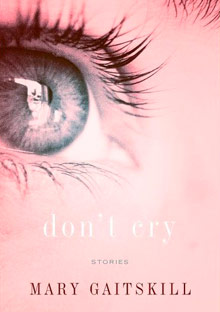
By Mary Gaitskill
240 pages; Pantheon
"The world is tipping over, like a table, and everything on it is falling off," writes Mary Gaitskill in the title story of Don't Cry, her latest mind-searing, soul-rattling, gratitude-inducing collection. In these stories, people talk to themselves in cars, in airports, in the privacy of their own homes, but they speak to each other most significantly without words. "I thrive," says the body of an Ethiopian orphan to the newly widowed woman into whose care he has momentarily been placed. A lonely hospital worker waiting at the curb for traffic to pass speaks with her eyes to an angry young man inside a car at a stoplight—"What you have is good," she "says," and he hears her. And in the hyperreal "Mirror Ball," a one-night stand leads to a lengthy conversation between two disembodied soul fragments that changes the lives of their barely conscious host-bodies forever. Gaitskill never tries to protect us, not from her vast, strange intelligence, her dazzling spirographic flights of language, nor from the annihilating beauty, the unutterable despair in the world. In this moment of cataclysm, each story asks, "What is the value of one human being's experience being accurately and specifically described?" And each story answers, "Nothing, everything." — Pam Houston
240 pages; Pantheon
"The world is tipping over, like a table, and everything on it is falling off," writes Mary Gaitskill in the title story of Don't Cry, her latest mind-searing, soul-rattling, gratitude-inducing collection. In these stories, people talk to themselves in cars, in airports, in the privacy of their own homes, but they speak to each other most significantly without words. "I thrive," says the body of an Ethiopian orphan to the newly widowed woman into whose care he has momentarily been placed. A lonely hospital worker waiting at the curb for traffic to pass speaks with her eyes to an angry young man inside a car at a stoplight—"What you have is good," she "says," and he hears her. And in the hyperreal "Mirror Ball," a one-night stand leads to a lengthy conversation between two disembodied soul fragments that changes the lives of their barely conscious host-bodies forever. Gaitskill never tries to protect us, not from her vast, strange intelligence, her dazzling spirographic flights of language, nor from the annihilating beauty, the unutterable despair in the world. In this moment of cataclysm, each story asks, "What is the value of one human being's experience being accurately and specifically described?" And each story answers, "Nothing, everything." — Pam Houston
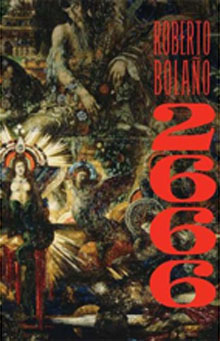
By Robert Bolaño
912 pages; Farrar, Straus and Giroux
Chilean novelist and poet Roberto Bolaño died in 2003, at only 50, cutting short a career that swept over the literary world like a tidal wave. His final novel, 2666 (Farrar, Straus and Giroux), published posthumously, takes on the real-life subject of hundreds of women who have been found killed over the last 15 years in the desert outside Ciudad Juárez on the Mexican-American border, one of the most disturbing series of crimes in Latin American history. Holding a reviewer's copy of 2666 in public was like brandishing the newest Harry Potter at the playground three months before the on-sale date. Half a dozen eager strangers who'd heard about the book spoke to me while I was reading it. Bolaño has particularly captured the imaginations of younger readers because his work is rather like a video game or a set of nested webpages, stories within stories with many apparent authors, and little sense of predetermined purpose. This five-part novel jumps from subject to subject, asking you to intuit the relevance of each to each: an obscure German novelist, a sad Mexican professor, reporters on the Juárez murders, policemen, and more. Bolaño recognizes that we live in a cacophony of a million public voices—his work evokes American pulp, Gabriel García Márquez, and Mexican surrealist Juan Rulfo, a fluid range of styles held together in a structural grip all Bolaño's own. Every scene is powerful and realistic; yet the overall effect is hallucinatory and dreamlike. What he captures so artfully is how a world headed toward chaos, exploitation, and violence can still be home to souls guided by gentleness and truth. The book is long and intense, but it is also the work of an extraordinary artist facing certain ultimate realities, and so will repay every moment of attention you can give it. — Vince Passaro
912 pages; Farrar, Straus and Giroux
Chilean novelist and poet Roberto Bolaño died in 2003, at only 50, cutting short a career that swept over the literary world like a tidal wave. His final novel, 2666 (Farrar, Straus and Giroux), published posthumously, takes on the real-life subject of hundreds of women who have been found killed over the last 15 years in the desert outside Ciudad Juárez on the Mexican-American border, one of the most disturbing series of crimes in Latin American history. Holding a reviewer's copy of 2666 in public was like brandishing the newest Harry Potter at the playground three months before the on-sale date. Half a dozen eager strangers who'd heard about the book spoke to me while I was reading it. Bolaño has particularly captured the imaginations of younger readers because his work is rather like a video game or a set of nested webpages, stories within stories with many apparent authors, and little sense of predetermined purpose. This five-part novel jumps from subject to subject, asking you to intuit the relevance of each to each: an obscure German novelist, a sad Mexican professor, reporters on the Juárez murders, policemen, and more. Bolaño recognizes that we live in a cacophony of a million public voices—his work evokes American pulp, Gabriel García Márquez, and Mexican surrealist Juan Rulfo, a fluid range of styles held together in a structural grip all Bolaño's own. Every scene is powerful and realistic; yet the overall effect is hallucinatory and dreamlike. What he captures so artfully is how a world headed toward chaos, exploitation, and violence can still be home to souls guided by gentleness and truth. The book is long and intense, but it is also the work of an extraordinary artist facing certain ultimate realities, and so will repay every moment of attention you can give it. — Vince Passaro

By Marilynne Robinson
336 pages; Farrar, Straus and Giroux
Marilynne Robinson's fascinating career has pinned our imaginations inside several memory-cramped family houses. In her aptly titled Home (Farrar, Straus and Giroux), Jack Boughton, the prodigal son of an aging paterfamilias, returns after 20 years to live with his sister Glory and their dying father. Those who loved Robinson's Pulitzer-winning novel, Gilead, will notice immediately that Home is set in the same Iowa town, and that the Reverend John Ames, the center of that story, lingers notably along the borders of this one. He is the elder Boughton's closest friend; Jack is his namesake, and Jack's tattered soul will become his to battle and repair. As claustrophobic as Robinson's situations can be, her prose is our flight out, a keen instrument of vision and transcendence. The book is told from the perspective of Glory, so this language is given a compelling personal voice. Through her we are able to see Jack: "the one true worldling in the whole tribe of Boughtons ... standing there in the sunlight with the wind hushing in the dusty lilacs of their childhood. ... He looked older in sunlight." While the men work out their splintery emotions, the wisdom and grace of the book resides in the quiet voice of the woman who loves them. — Vince Passaro
336 pages; Farrar, Straus and Giroux
Marilynne Robinson's fascinating career has pinned our imaginations inside several memory-cramped family houses. In her aptly titled Home (Farrar, Straus and Giroux), Jack Boughton, the prodigal son of an aging paterfamilias, returns after 20 years to live with his sister Glory and their dying father. Those who loved Robinson's Pulitzer-winning novel, Gilead, will notice immediately that Home is set in the same Iowa town, and that the Reverend John Ames, the center of that story, lingers notably along the borders of this one. He is the elder Boughton's closest friend; Jack is his namesake, and Jack's tattered soul will become his to battle and repair. As claustrophobic as Robinson's situations can be, her prose is our flight out, a keen instrument of vision and transcendence. The book is told from the perspective of Glory, so this language is given a compelling personal voice. Through her we are able to see Jack: "the one true worldling in the whole tribe of Boughtons ... standing there in the sunlight with the wind hushing in the dusty lilacs of their childhood. ... He looked older in sunlight." While the men work out their splintery emotions, the wisdom and grace of the book resides in the quiet voice of the woman who loves them. — Vince Passaro
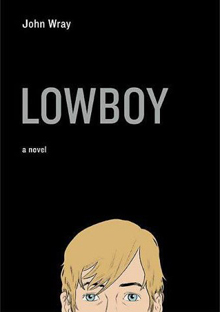
By John Wray
320 pages; Farrar, Straus, and Giroux
A breathtaking journey through the subway tunnels of Manhattan and the subterranean fantasies of a schizophrenic teen, the eponymous Lowboy careens toward disaster as the boy, a.k.a. Will Heller, disappears into the urban netherland. A wary detective gives chase, along with "Violet," a mother who harbors disturbing secrets about her son. Lowboy has an apocalyptic obsession with global warming (he believes that only he can save the world), but more immediate perils reside in the twists and turns of the human psyche. — Cathleen Medwick
320 pages; Farrar, Straus, and Giroux
A breathtaking journey through the subway tunnels of Manhattan and the subterranean fantasies of a schizophrenic teen, the eponymous Lowboy careens toward disaster as the boy, a.k.a. Will Heller, disappears into the urban netherland. A wary detective gives chase, along with "Violet," a mother who harbors disturbing secrets about her son. Lowboy has an apocalyptic obsession with global warming (he believes that only he can save the world), but more immediate perils reside in the twists and turns of the human psyche. — Cathleen Medwick

By Philip Roth
256 pages; Houghton Mifflin
If Philip Roth were more lovable, he would have been universally recognized as the premier American novelist of the past 50 years. Unfortunately, he is not lovable—worse, he is almost invariably right. Indignation (Houghton Mifflin), his astute new novel, is about a young man named Marcus who is, like Roth, a Jew from Newark entering college in the early '50s and, also like Roth, a prickly and unforgiving skeptic. It is the story of Marcus's year at the fictional Winesburg College in Ohio—the reference is to Sherwood Anderson's dark portrait of adamantly naive Americans, Winesburg, Ohio—a year that exposes him to the absurdity and the perils of adult life. The Korean War dominates the book; at one point the conservative president of the college upbraids the male students (after an ill-fated panty raid): "Beyond your dormitories a world is on fire, and you are kindled by underwear." Since this accusation holds even truer now than when Roth depicts it being uttered, we can see again his shocking ability to bring history to bear on the present. As always, the prose is well built—sinewy and graceful—and, as always, the wit is sharp as a German knife. There are simply no novels by Roth in which you cannot detect the hand of a master. — Vince Passaro
256 pages; Houghton Mifflin
If Philip Roth were more lovable, he would have been universally recognized as the premier American novelist of the past 50 years. Unfortunately, he is not lovable—worse, he is almost invariably right. Indignation (Houghton Mifflin), his astute new novel, is about a young man named Marcus who is, like Roth, a Jew from Newark entering college in the early '50s and, also like Roth, a prickly and unforgiving skeptic. It is the story of Marcus's year at the fictional Winesburg College in Ohio—the reference is to Sherwood Anderson's dark portrait of adamantly naive Americans, Winesburg, Ohio—a year that exposes him to the absurdity and the perils of adult life. The Korean War dominates the book; at one point the conservative president of the college upbraids the male students (after an ill-fated panty raid): "Beyond your dormitories a world is on fire, and you are kindled by underwear." Since this accusation holds even truer now than when Roth depicts it being uttered, we can see again his shocking ability to bring history to bear on the present. As always, the prose is well built—sinewy and graceful—and, as always, the wit is sharp as a German knife. There are simply no novels by Roth in which you cannot detect the hand of a master. — Vince Passaro
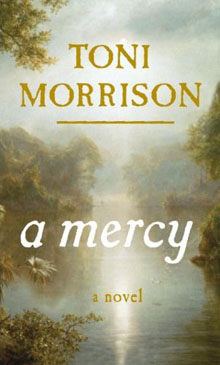
By Toni Morrison
176 pages; Knopf
A young girl scratching her story into the floorboards of an unused room in a house that belongs to a dead man. A she-eagle, who, upon hearing the evil thoughts of man, falls out of her nest and falls forever, leaving her eaglets to find their way into the world alone. A young wife, who, after learning the "intricacy of loneliness" associated with marriage, comes down with smallpox and apologizes to her face in the mirror over and over again. These are a few of the memorable characters that populate Toni Morrison's lyrical ninth novel, A Mercy (Knopf). It is 1682 in Maryland. The slave and rum trade runs through Barbados, Native Americans are dying in droves from European diseases, and most women live "of and for men," their three choices: servant, prostitute, wife. But this place and time is also full of miracles and mercies—a surprising and enduring friendship, a mother's intuitive sacrifice, a company man's stumbling but tenacious goodwill. American history, the natural world, and human desire collide in a series of musical voices, distinct from one another—unmistakably Morrisonian in their beauty and power—that together tell this moving and morally complicated tale. "Sudden a sheet of sparrows fall from the sky and settle in the trees. So many the trees seem to sprout birds, not leaves at all. Lina points. We never shape the world she says. The world shapes us. Sudden and silent the sparrows are gone." — Pam Houston
176 pages; Knopf
A young girl scratching her story into the floorboards of an unused room in a house that belongs to a dead man. A she-eagle, who, upon hearing the evil thoughts of man, falls out of her nest and falls forever, leaving her eaglets to find their way into the world alone. A young wife, who, after learning the "intricacy of loneliness" associated with marriage, comes down with smallpox and apologizes to her face in the mirror over and over again. These are a few of the memorable characters that populate Toni Morrison's lyrical ninth novel, A Mercy (Knopf). It is 1682 in Maryland. The slave and rum trade runs through Barbados, Native Americans are dying in droves from European diseases, and most women live "of and for men," their three choices: servant, prostitute, wife. But this place and time is also full of miracles and mercies—a surprising and enduring friendship, a mother's intuitive sacrifice, a company man's stumbling but tenacious goodwill. American history, the natural world, and human desire collide in a series of musical voices, distinct from one another—unmistakably Morrisonian in their beauty and power—that together tell this moving and morally complicated tale. "Sudden a sheet of sparrows fall from the sky and settle in the trees. So many the trees seem to sprout birds, not leaves at all. Lina points. We never shape the world she says. The world shapes us. Sudden and silent the sparrows are gone." — Pam Houston
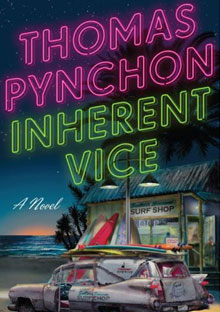
By Thomas Pynchon
384 pages; Penguin
Reading Thomas Pynchon again, one is reminded that fiction can clarify the world—capturing it as it seems to be—and it can also change the world by seeing it in new ways. Pynchon is a magician in the second category: He applies language to what we know and all we've missed—giving new shape to both. His latest novel, Inherent Vice, is a putative detective story set in California in the late '60s. Even the title makes you stop and puzzle out a new meaning: Does vice inhere? He might have called it "Original Sin" and no one would have given it a thought. It involves a missing rich guy, a spectacular murder, a musician reported dead who likely isn't, the early Internet and its invitation to surveillance, and plenty more. Its detective, Doc Sportello, is a blend of classic California noir hero and committed hippie stoner of the very old school (you can feel a touch of Altman's marvelous '70s version of The Long Goodbye, along with echoes of William Burroughs). The book is exuberant, delightfully evocative of its era, and very funny—one rarely hears mention of Pynchon's wonderful feel for comedy—and it has behind it a drumbeat of warning, about the kind of society we were building then and are living in now, in which nothing is private and all the important public mysteries will remain unsolved. — Vince Passaro
384 pages; Penguin
Reading Thomas Pynchon again, one is reminded that fiction can clarify the world—capturing it as it seems to be—and it can also change the world by seeing it in new ways. Pynchon is a magician in the second category: He applies language to what we know and all we've missed—giving new shape to both. His latest novel, Inherent Vice, is a putative detective story set in California in the late '60s. Even the title makes you stop and puzzle out a new meaning: Does vice inhere? He might have called it "Original Sin" and no one would have given it a thought. It involves a missing rich guy, a spectacular murder, a musician reported dead who likely isn't, the early Internet and its invitation to surveillance, and plenty more. Its detective, Doc Sportello, is a blend of classic California noir hero and committed hippie stoner of the very old school (you can feel a touch of Altman's marvelous '70s version of The Long Goodbye, along with echoes of William Burroughs). The book is exuberant, delightfully evocative of its era, and very funny—one rarely hears mention of Pynchon's wonderful feel for comedy—and it has behind it a drumbeat of warning, about the kind of society we were building then and are living in now, in which nothing is private and all the important public mysteries will remain unsolved. — Vince Passaro




